Sports Psychology: Exploring Behavioral Perspectives and Analysis
VerifiedAdded on 2022/08/13
|7
|1956
|17
Report
AI Summary
This report delves into the realm of sports psychology, examining how psychological factors shape the behavior of athletes. It explores five key perspectives: biological, humanistic, cognitive, behavioral, and psychoanalytic. The report defines and describes each perspective, highlighting their fundamental ideas and applications within the context of sports. The psychoanalytic approach is then examined in greater detail, with a focus on the behavioral example of Serena Williams. The report analyzes Serena Williams' behavior during a match, interpreting her actions through a psychoanalytic lens, considering potential triggers and underlying psychological motivations. This comprehensive analysis provides insights into the complex interplay between psychology and sports performance, offering a deeper understanding of athlete behavior and the various factors that influence it.
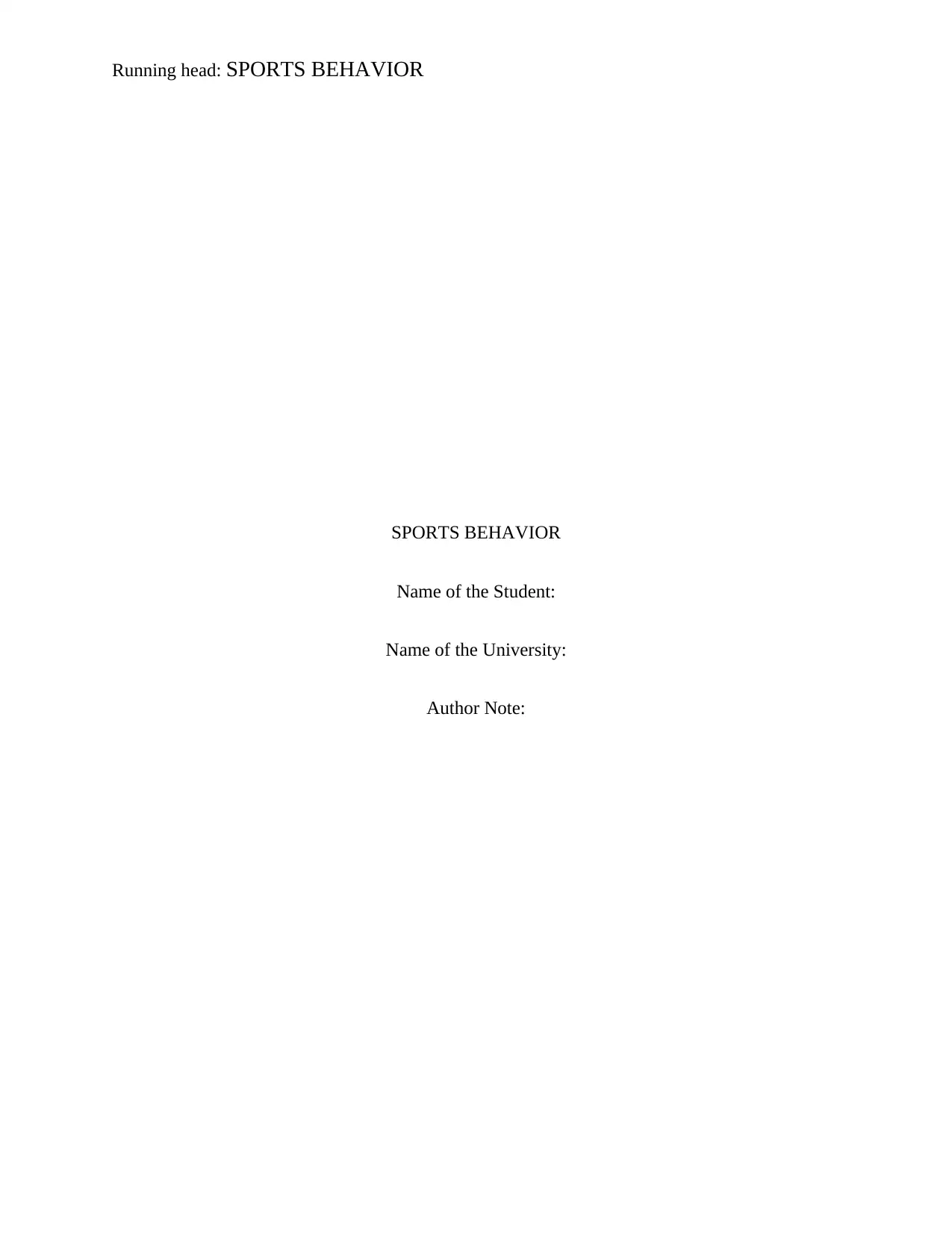
Running head: SPORTS BEHAVIOR
SPORTS BEHAVIOR
Name of the Student:
Name of the University:
Author Note:
SPORTS BEHAVIOR
Name of the Student:
Name of the University:
Author Note:
Paraphrase This Document
Need a fresh take? Get an instant paraphrase of this document with our AI Paraphraser
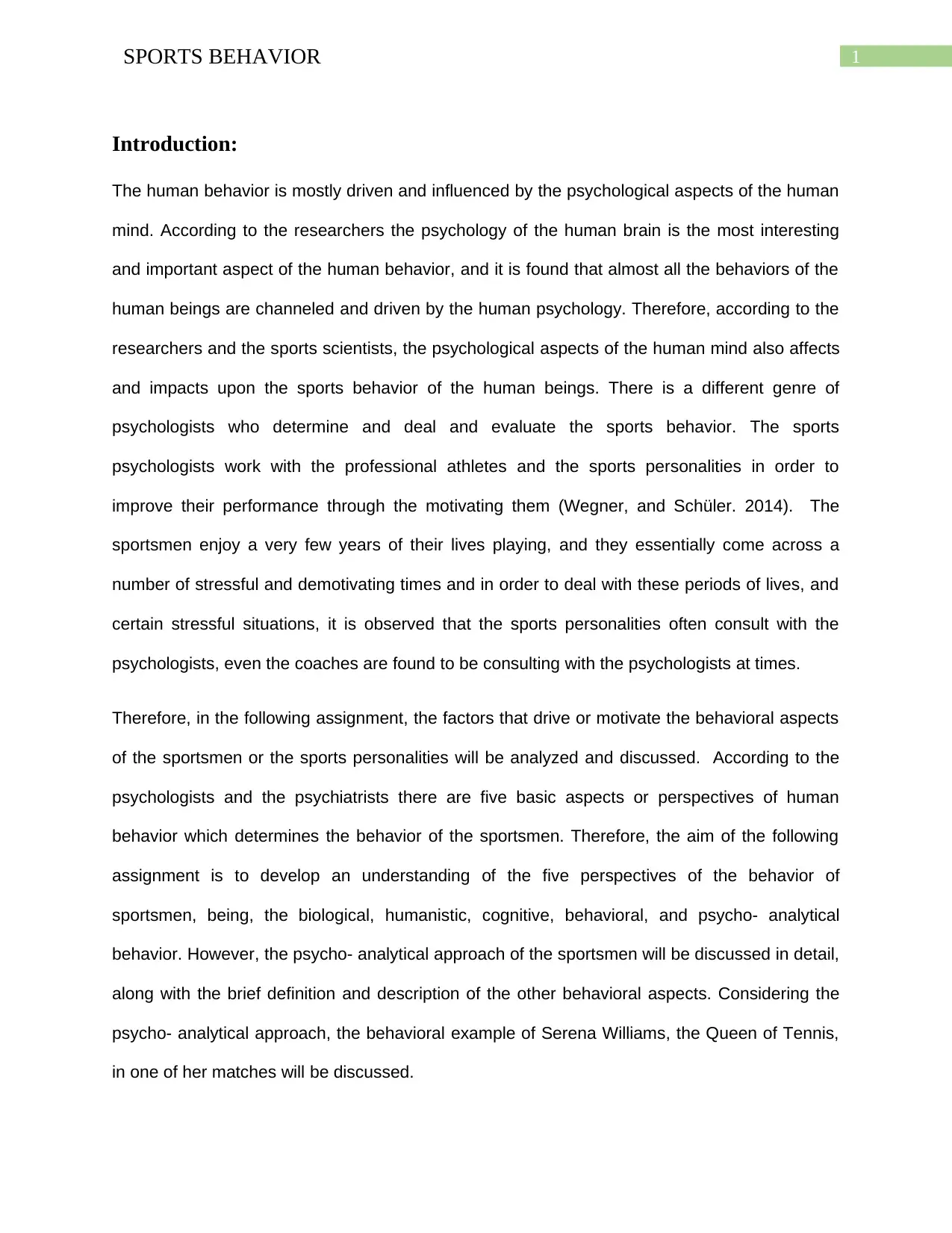
1SPORTS BEHAVIOR
Introduction:
The human behavior is mostly driven and influenced by the psychological aspects of the human
mind. According to the researchers the psychology of the human brain is the most interesting
and important aspect of the human behavior, and it is found that almost all the behaviors of the
human beings are channeled and driven by the human psychology. Therefore, according to the
researchers and the sports scientists, the psychological aspects of the human mind also affects
and impacts upon the sports behavior of the human beings. There is a different genre of
psychologists who determine and deal and evaluate the sports behavior. The sports
psychologists work with the professional athletes and the sports personalities in order to
improve their performance through the motivating them (Wegner, and Schüler. 2014). The
sportsmen enjoy a very few years of their lives playing, and they essentially come across a
number of stressful and demotivating times and in order to deal with these periods of lives, and
certain stressful situations, it is observed that the sports personalities often consult with the
psychologists, even the coaches are found to be consulting with the psychologists at times.
Therefore, in the following assignment, the factors that drive or motivate the behavioral aspects
of the sportsmen or the sports personalities will be analyzed and discussed. According to the
psychologists and the psychiatrists there are five basic aspects or perspectives of human
behavior which determines the behavior of the sportsmen. Therefore, the aim of the following
assignment is to develop an understanding of the five perspectives of the behavior of
sportsmen, being, the biological, humanistic, cognitive, behavioral, and psycho- analytical
behavior. However, the psycho- analytical approach of the sportsmen will be discussed in detail,
along with the brief definition and description of the other behavioral aspects. Considering the
psycho- analytical approach, the behavioral example of Serena Williams, the Queen of Tennis,
in one of her matches will be discussed.
Introduction:
The human behavior is mostly driven and influenced by the psychological aspects of the human
mind. According to the researchers the psychology of the human brain is the most interesting
and important aspect of the human behavior, and it is found that almost all the behaviors of the
human beings are channeled and driven by the human psychology. Therefore, according to the
researchers and the sports scientists, the psychological aspects of the human mind also affects
and impacts upon the sports behavior of the human beings. There is a different genre of
psychologists who determine and deal and evaluate the sports behavior. The sports
psychologists work with the professional athletes and the sports personalities in order to
improve their performance through the motivating them (Wegner, and Schüler. 2014). The
sportsmen enjoy a very few years of their lives playing, and they essentially come across a
number of stressful and demotivating times and in order to deal with these periods of lives, and
certain stressful situations, it is observed that the sports personalities often consult with the
psychologists, even the coaches are found to be consulting with the psychologists at times.
Therefore, in the following assignment, the factors that drive or motivate the behavioral aspects
of the sportsmen or the sports personalities will be analyzed and discussed. According to the
psychologists and the psychiatrists there are five basic aspects or perspectives of human
behavior which determines the behavior of the sportsmen. Therefore, the aim of the following
assignment is to develop an understanding of the five perspectives of the behavior of
sportsmen, being, the biological, humanistic, cognitive, behavioral, and psycho- analytical
behavior. However, the psycho- analytical approach of the sportsmen will be discussed in detail,
along with the brief definition and description of the other behavioral aspects. Considering the
psycho- analytical approach, the behavioral example of Serena Williams, the Queen of Tennis,
in one of her matches will be discussed.
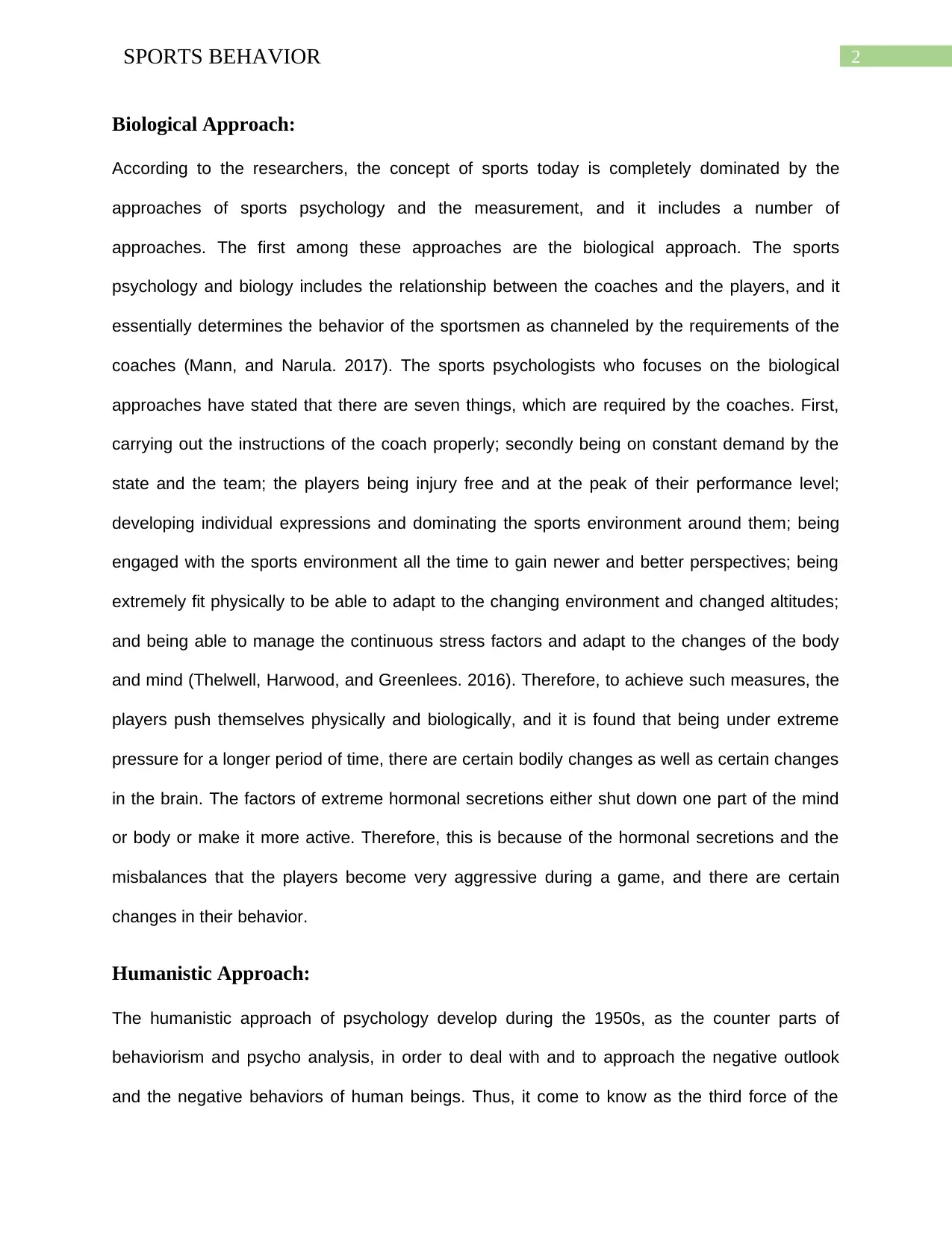
2SPORTS BEHAVIOR
Biological Approach:
According to the researchers, the concept of sports today is completely dominated by the
approaches of sports psychology and the measurement, and it includes a number of
approaches. The first among these approaches are the biological approach. The sports
psychology and biology includes the relationship between the coaches and the players, and it
essentially determines the behavior of the sportsmen as channeled by the requirements of the
coaches (Mann, and Narula. 2017). The sports psychologists who focuses on the biological
approaches have stated that there are seven things, which are required by the coaches. First,
carrying out the instructions of the coach properly; secondly being on constant demand by the
state and the team; the players being injury free and at the peak of their performance level;
developing individual expressions and dominating the sports environment around them; being
engaged with the sports environment all the time to gain newer and better perspectives; being
extremely fit physically to be able to adapt to the changing environment and changed altitudes;
and being able to manage the continuous stress factors and adapt to the changes of the body
and mind (Thelwell, Harwood, and Greenlees. 2016). Therefore, to achieve such measures, the
players push themselves physically and biologically, and it is found that being under extreme
pressure for a longer period of time, there are certain bodily changes as well as certain changes
in the brain. The factors of extreme hormonal secretions either shut down one part of the mind
or body or make it more active. Therefore, this is because of the hormonal secretions and the
misbalances that the players become very aggressive during a game, and there are certain
changes in their behavior.
Humanistic Approach:
The humanistic approach of psychology develop during the 1950s, as the counter parts of
behaviorism and psycho analysis, in order to deal with and to approach the negative outlook
and the negative behaviors of human beings. Thus, it come to know as the third force of the
Biological Approach:
According to the researchers, the concept of sports today is completely dominated by the
approaches of sports psychology and the measurement, and it includes a number of
approaches. The first among these approaches are the biological approach. The sports
psychology and biology includes the relationship between the coaches and the players, and it
essentially determines the behavior of the sportsmen as channeled by the requirements of the
coaches (Mann, and Narula. 2017). The sports psychologists who focuses on the biological
approaches have stated that there are seven things, which are required by the coaches. First,
carrying out the instructions of the coach properly; secondly being on constant demand by the
state and the team; the players being injury free and at the peak of their performance level;
developing individual expressions and dominating the sports environment around them; being
engaged with the sports environment all the time to gain newer and better perspectives; being
extremely fit physically to be able to adapt to the changing environment and changed altitudes;
and being able to manage the continuous stress factors and adapt to the changes of the body
and mind (Thelwell, Harwood, and Greenlees. 2016). Therefore, to achieve such measures, the
players push themselves physically and biologically, and it is found that being under extreme
pressure for a longer period of time, there are certain bodily changes as well as certain changes
in the brain. The factors of extreme hormonal secretions either shut down one part of the mind
or body or make it more active. Therefore, this is because of the hormonal secretions and the
misbalances that the players become very aggressive during a game, and there are certain
changes in their behavior.
Humanistic Approach:
The humanistic approach of psychology develop during the 1950s, as the counter parts of
behaviorism and psycho analysis, in order to deal with and to approach the negative outlook
and the negative behaviors of human beings. Thus, it come to know as the third force of the
⊘ This is a preview!⊘
Do you want full access?
Subscribe today to unlock all pages.

Trusted by 1+ million students worldwide
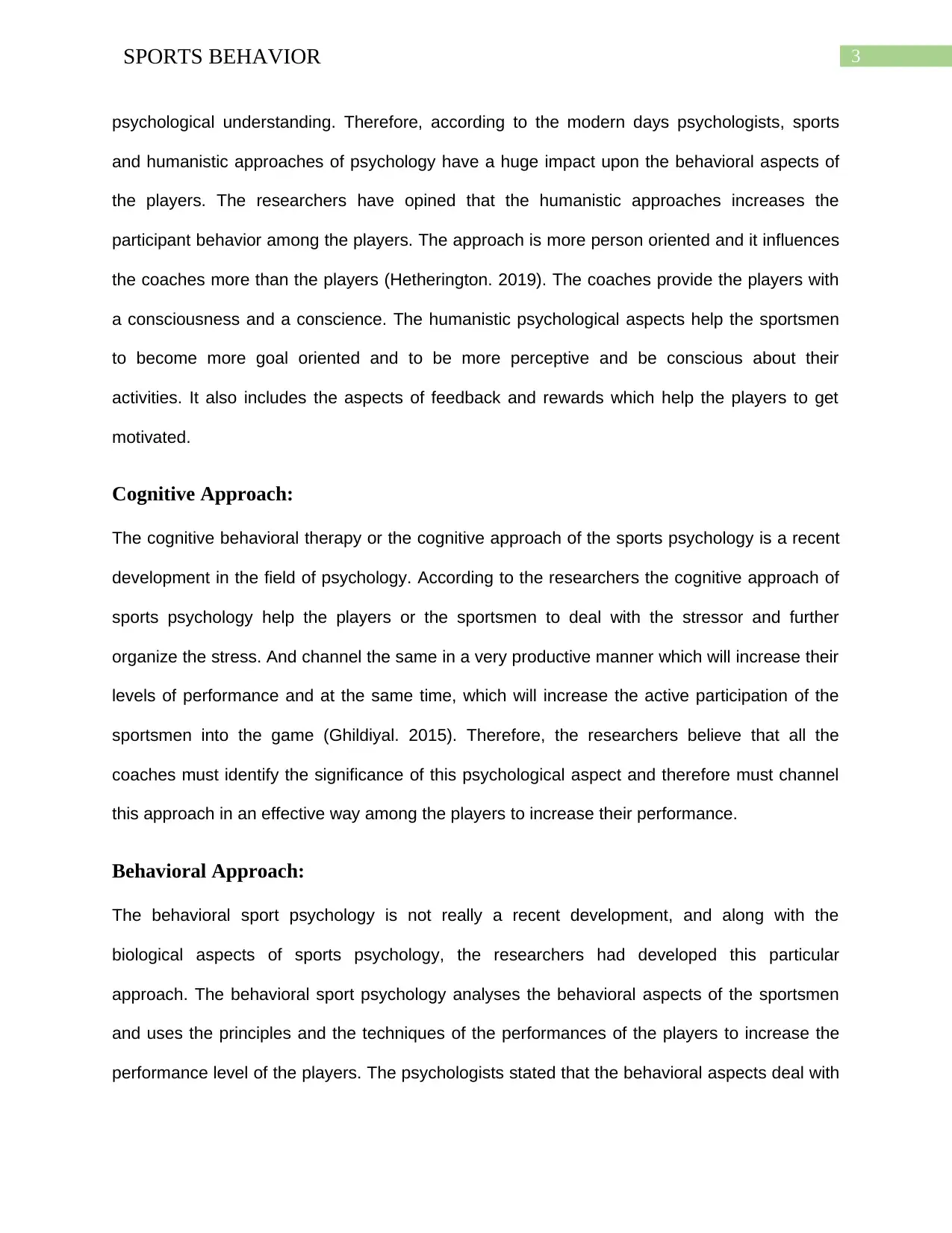
3SPORTS BEHAVIOR
psychological understanding. Therefore, according to the modern days psychologists, sports
and humanistic approaches of psychology have a huge impact upon the behavioral aspects of
the players. The researchers have opined that the humanistic approaches increases the
participant behavior among the players. The approach is more person oriented and it influences
the coaches more than the players (Hetherington. 2019). The coaches provide the players with
a consciousness and a conscience. The humanistic psychological aspects help the sportsmen
to become more goal oriented and to be more perceptive and be conscious about their
activities. It also includes the aspects of feedback and rewards which help the players to get
motivated.
Cognitive Approach:
The cognitive behavioral therapy or the cognitive approach of the sports psychology is a recent
development in the field of psychology. According to the researchers the cognitive approach of
sports psychology help the players or the sportsmen to deal with the stressor and further
organize the stress. And channel the same in a very productive manner which will increase their
levels of performance and at the same time, which will increase the active participation of the
sportsmen into the game (Ghildiyal. 2015). Therefore, the researchers believe that all the
coaches must identify the significance of this psychological aspect and therefore must channel
this approach in an effective way among the players to increase their performance.
Behavioral Approach:
The behavioral sport psychology is not really a recent development, and along with the
biological aspects of sports psychology, the researchers had developed this particular
approach. The behavioral sport psychology analyses the behavioral aspects of the sportsmen
and uses the principles and the techniques of the performances of the players to increase the
performance level of the players. The psychologists stated that the behavioral aspects deal with
psychological understanding. Therefore, according to the modern days psychologists, sports
and humanistic approaches of psychology have a huge impact upon the behavioral aspects of
the players. The researchers have opined that the humanistic approaches increases the
participant behavior among the players. The approach is more person oriented and it influences
the coaches more than the players (Hetherington. 2019). The coaches provide the players with
a consciousness and a conscience. The humanistic psychological aspects help the sportsmen
to become more goal oriented and to be more perceptive and be conscious about their
activities. It also includes the aspects of feedback and rewards which help the players to get
motivated.
Cognitive Approach:
The cognitive behavioral therapy or the cognitive approach of the sports psychology is a recent
development in the field of psychology. According to the researchers the cognitive approach of
sports psychology help the players or the sportsmen to deal with the stressor and further
organize the stress. And channel the same in a very productive manner which will increase their
levels of performance and at the same time, which will increase the active participation of the
sportsmen into the game (Ghildiyal. 2015). Therefore, the researchers believe that all the
coaches must identify the significance of this psychological aspect and therefore must channel
this approach in an effective way among the players to increase their performance.
Behavioral Approach:
The behavioral sport psychology is not really a recent development, and along with the
biological aspects of sports psychology, the researchers had developed this particular
approach. The behavioral sport psychology analyses the behavioral aspects of the sportsmen
and uses the principles and the techniques of the performances of the players to increase the
performance level of the players. The psychologists stated that the behavioral aspects deal with
Paraphrase This Document
Need a fresh take? Get an instant paraphrase of this document with our AI Paraphraser
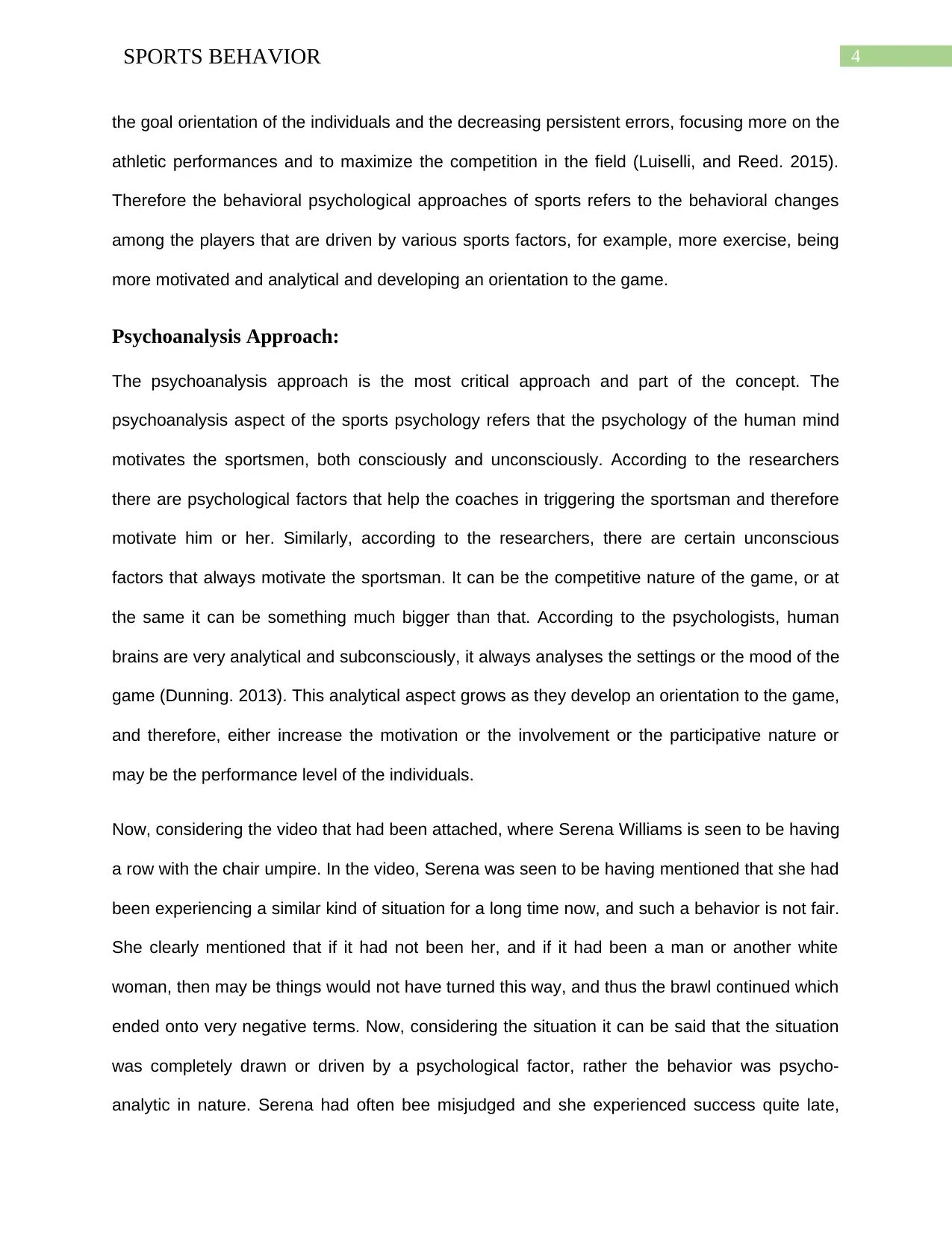
4SPORTS BEHAVIOR
the goal orientation of the individuals and the decreasing persistent errors, focusing more on the
athletic performances and to maximize the competition in the field (Luiselli, and Reed. 2015).
Therefore the behavioral psychological approaches of sports refers to the behavioral changes
among the players that are driven by various sports factors, for example, more exercise, being
more motivated and analytical and developing an orientation to the game.
Psychoanalysis Approach:
The psychoanalysis approach is the most critical approach and part of the concept. The
psychoanalysis aspect of the sports psychology refers that the psychology of the human mind
motivates the sportsmen, both consciously and unconsciously. According to the researchers
there are psychological factors that help the coaches in triggering the sportsman and therefore
motivate him or her. Similarly, according to the researchers, there are certain unconscious
factors that always motivate the sportsman. It can be the competitive nature of the game, or at
the same it can be something much bigger than that. According to the psychologists, human
brains are very analytical and subconsciously, it always analyses the settings or the mood of the
game (Dunning. 2013). This analytical aspect grows as they develop an orientation to the game,
and therefore, either increase the motivation or the involvement or the participative nature or
may be the performance level of the individuals.
Now, considering the video that had been attached, where Serena Williams is seen to be having
a row with the chair umpire. In the video, Serena was seen to be having mentioned that she had
been experiencing a similar kind of situation for a long time now, and such a behavior is not fair.
She clearly mentioned that if it had not been her, and if it had been a man or another white
woman, then may be things would not have turned this way, and thus the brawl continued which
ended onto very negative terms. Now, considering the situation it can be said that the situation
was completely drawn or driven by a psychological factor, rather the behavior was psycho-
analytic in nature. Serena had often bee misjudged and she experienced success quite late,
the goal orientation of the individuals and the decreasing persistent errors, focusing more on the
athletic performances and to maximize the competition in the field (Luiselli, and Reed. 2015).
Therefore the behavioral psychological approaches of sports refers to the behavioral changes
among the players that are driven by various sports factors, for example, more exercise, being
more motivated and analytical and developing an orientation to the game.
Psychoanalysis Approach:
The psychoanalysis approach is the most critical approach and part of the concept. The
psychoanalysis aspect of the sports psychology refers that the psychology of the human mind
motivates the sportsmen, both consciously and unconsciously. According to the researchers
there are psychological factors that help the coaches in triggering the sportsman and therefore
motivate him or her. Similarly, according to the researchers, there are certain unconscious
factors that always motivate the sportsman. It can be the competitive nature of the game, or at
the same it can be something much bigger than that. According to the psychologists, human
brains are very analytical and subconsciously, it always analyses the settings or the mood of the
game (Dunning. 2013). This analytical aspect grows as they develop an orientation to the game,
and therefore, either increase the motivation or the involvement or the participative nature or
may be the performance level of the individuals.
Now, considering the video that had been attached, where Serena Williams is seen to be having
a row with the chair umpire. In the video, Serena was seen to be having mentioned that she had
been experiencing a similar kind of situation for a long time now, and such a behavior is not fair.
She clearly mentioned that if it had not been her, and if it had been a man or another white
woman, then may be things would not have turned this way, and thus the brawl continued which
ended onto very negative terms. Now, considering the situation it can be said that the situation
was completely drawn or driven by a psychological factor, rather the behavior was psycho-
analytic in nature. Serena had often bee misjudged and she experienced success quite late,
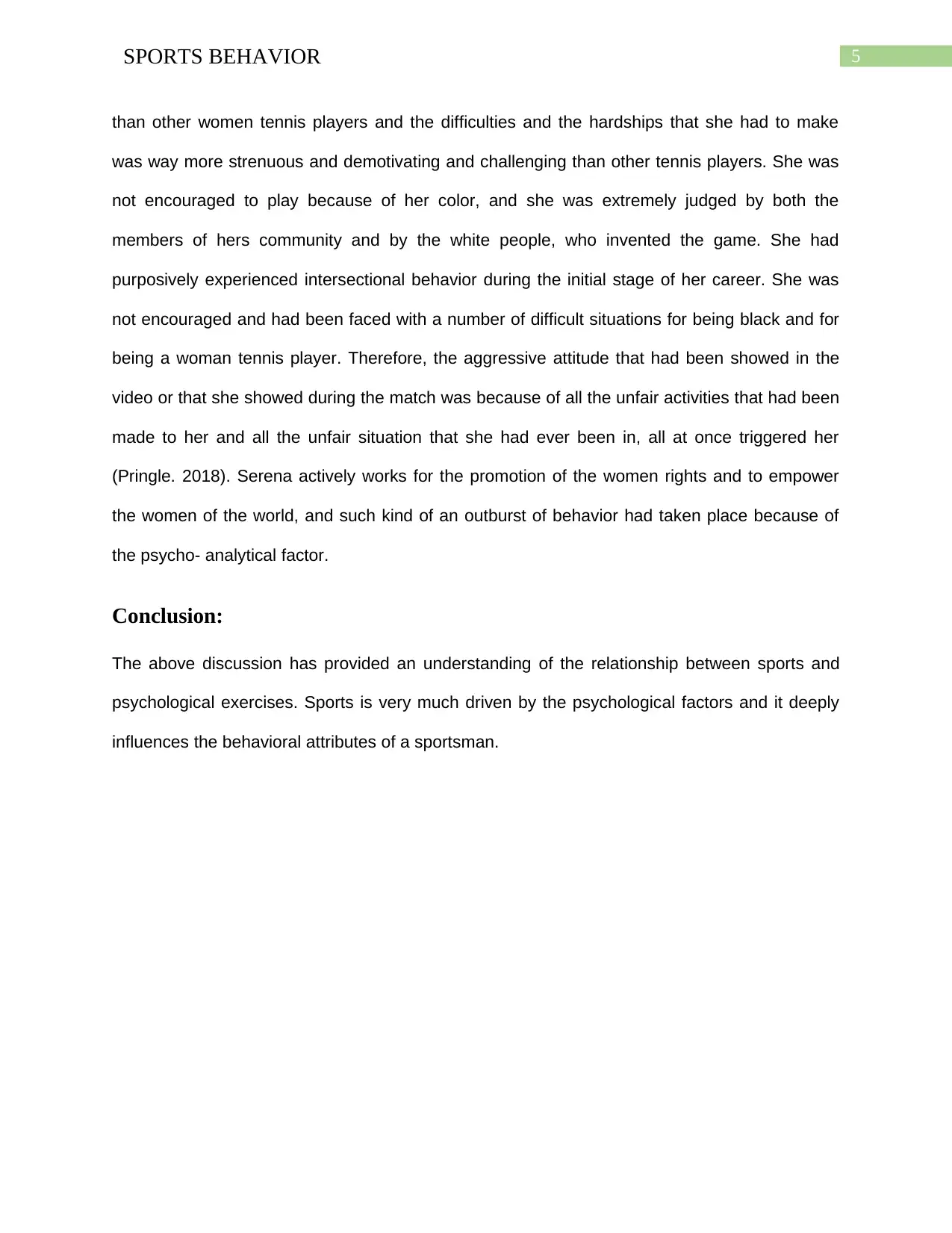
5SPORTS BEHAVIOR
than other women tennis players and the difficulties and the hardships that she had to make
was way more strenuous and demotivating and challenging than other tennis players. She was
not encouraged to play because of her color, and she was extremely judged by both the
members of hers community and by the white people, who invented the game. She had
purposively experienced intersectional behavior during the initial stage of her career. She was
not encouraged and had been faced with a number of difficult situations for being black and for
being a woman tennis player. Therefore, the aggressive attitude that had been showed in the
video or that she showed during the match was because of all the unfair activities that had been
made to her and all the unfair situation that she had ever been in, all at once triggered her
(Pringle. 2018). Serena actively works for the promotion of the women rights and to empower
the women of the world, and such kind of an outburst of behavior had taken place because of
the psycho- analytical factor.
Conclusion:
The above discussion has provided an understanding of the relationship between sports and
psychological exercises. Sports is very much driven by the psychological factors and it deeply
influences the behavioral attributes of a sportsman.
than other women tennis players and the difficulties and the hardships that she had to make
was way more strenuous and demotivating and challenging than other tennis players. She was
not encouraged to play because of her color, and she was extremely judged by both the
members of hers community and by the white people, who invented the game. She had
purposively experienced intersectional behavior during the initial stage of her career. She was
not encouraged and had been faced with a number of difficult situations for being black and for
being a woman tennis player. Therefore, the aggressive attitude that had been showed in the
video or that she showed during the match was because of all the unfair activities that had been
made to her and all the unfair situation that she had ever been in, all at once triggered her
(Pringle. 2018). Serena actively works for the promotion of the women rights and to empower
the women of the world, and such kind of an outburst of behavior had taken place because of
the psycho- analytical factor.
Conclusion:
The above discussion has provided an understanding of the relationship between sports and
psychological exercises. Sports is very much driven by the psychological factors and it deeply
influences the behavioral attributes of a sportsman.
⊘ This is a preview!⊘
Do you want full access?
Subscribe today to unlock all pages.

Trusted by 1+ million students worldwide
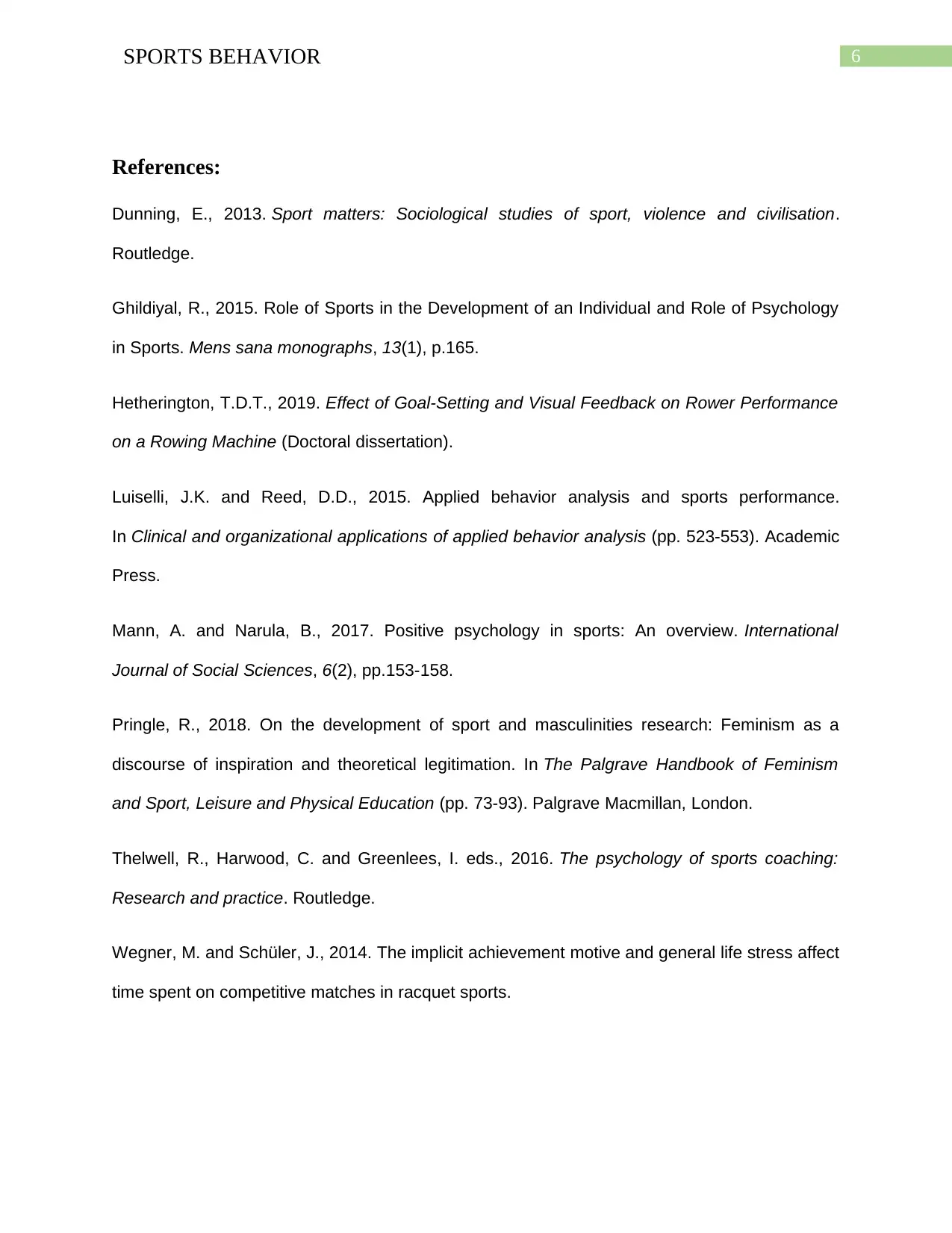
6SPORTS BEHAVIOR
References:
Dunning, E., 2013. Sport matters: Sociological studies of sport, violence and civilisation.
Routledge.
Ghildiyal, R., 2015. Role of Sports in the Development of an Individual and Role of Psychology
in Sports. Mens sana monographs, 13(1), p.165.
Hetherington, T.D.T., 2019. Effect of Goal-Setting and Visual Feedback on Rower Performance
on a Rowing Machine (Doctoral dissertation).
Luiselli, J.K. and Reed, D.D., 2015. Applied behavior analysis and sports performance.
In Clinical and organizational applications of applied behavior analysis (pp. 523-553). Academic
Press.
Mann, A. and Narula, B., 2017. Positive psychology in sports: An overview. International
Journal of Social Sciences, 6(2), pp.153-158.
Pringle, R., 2018. On the development of sport and masculinities research: Feminism as a
discourse of inspiration and theoretical legitimation. In The Palgrave Handbook of Feminism
and Sport, Leisure and Physical Education (pp. 73-93). Palgrave Macmillan, London.
Thelwell, R., Harwood, C. and Greenlees, I. eds., 2016. The psychology of sports coaching:
Research and practice. Routledge.
Wegner, M. and Schüler, J., 2014. The implicit achievement motive and general life stress affect
time spent on competitive matches in racquet sports.
References:
Dunning, E., 2013. Sport matters: Sociological studies of sport, violence and civilisation.
Routledge.
Ghildiyal, R., 2015. Role of Sports in the Development of an Individual and Role of Psychology
in Sports. Mens sana monographs, 13(1), p.165.
Hetherington, T.D.T., 2019. Effect of Goal-Setting and Visual Feedback on Rower Performance
on a Rowing Machine (Doctoral dissertation).
Luiselli, J.K. and Reed, D.D., 2015. Applied behavior analysis and sports performance.
In Clinical and organizational applications of applied behavior analysis (pp. 523-553). Academic
Press.
Mann, A. and Narula, B., 2017. Positive psychology in sports: An overview. International
Journal of Social Sciences, 6(2), pp.153-158.
Pringle, R., 2018. On the development of sport and masculinities research: Feminism as a
discourse of inspiration and theoretical legitimation. In The Palgrave Handbook of Feminism
and Sport, Leisure and Physical Education (pp. 73-93). Palgrave Macmillan, London.
Thelwell, R., Harwood, C. and Greenlees, I. eds., 2016. The psychology of sports coaching:
Research and practice. Routledge.
Wegner, M. and Schüler, J., 2014. The implicit achievement motive and general life stress affect
time spent on competitive matches in racquet sports.
1 out of 7
Related Documents
Your All-in-One AI-Powered Toolkit for Academic Success.
+13062052269
info@desklib.com
Available 24*7 on WhatsApp / Email
![[object Object]](/_next/static/media/star-bottom.7253800d.svg)
Unlock your academic potential
Copyright © 2020–2025 A2Z Services. All Rights Reserved. Developed and managed by ZUCOL.




